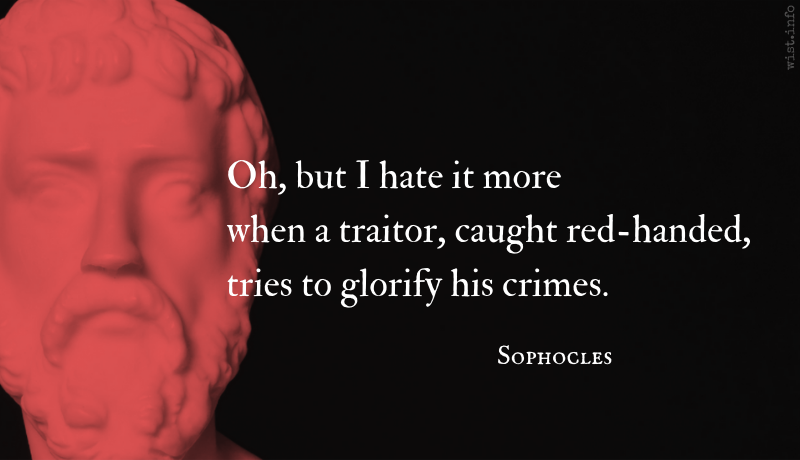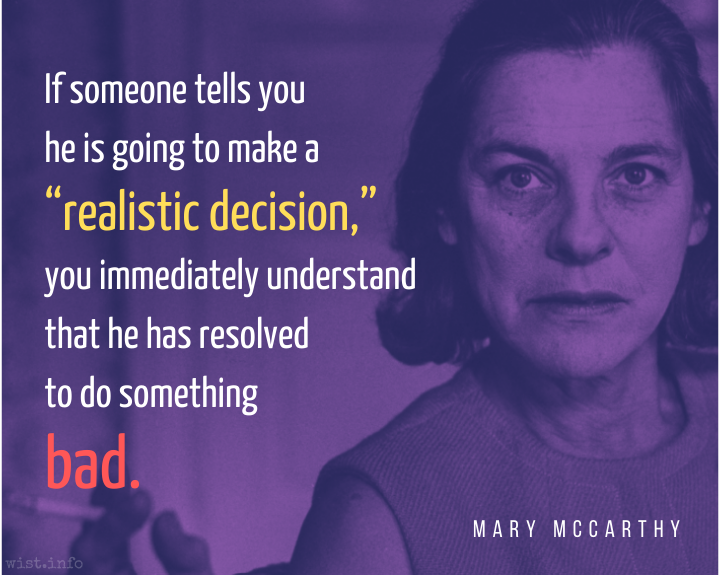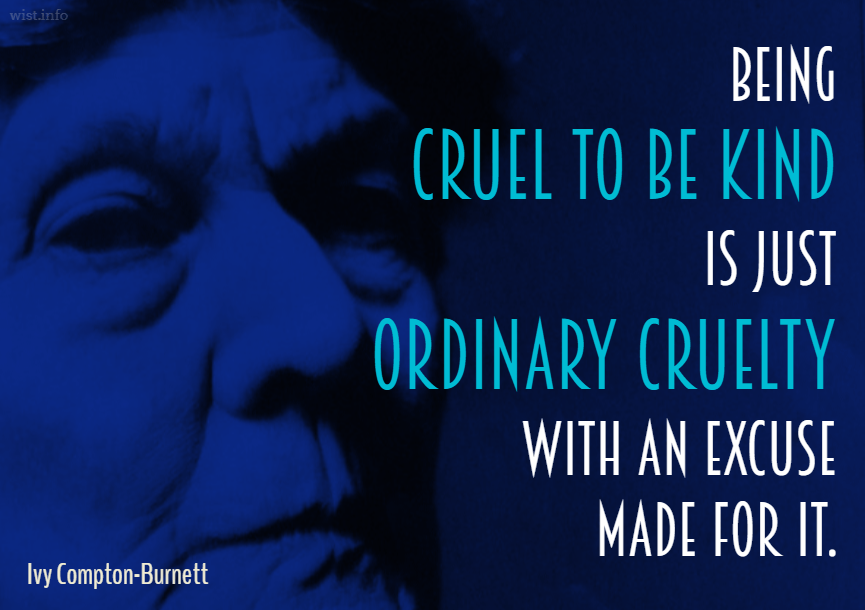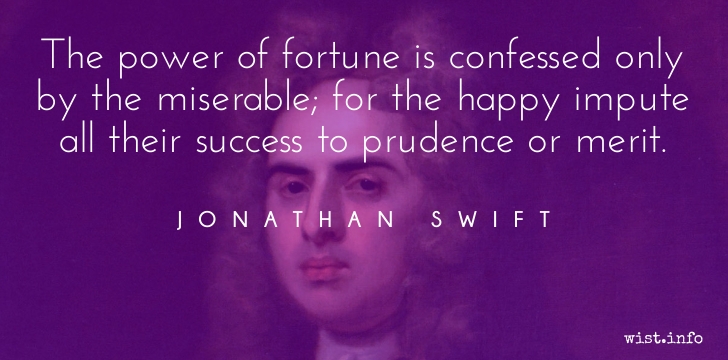“Just once more” is the Devil’s best argument.
Helen Rowland (1875-1950) American journalist and humorist
Reflections of a Bachelor Girl (1909)
(Source)
Quotations about:
justification
Note not all quotations have been tagged, so Search may find additional quotes on this topic.
We first debase the nature of man by making him a slave, and then very coolly tell him that he must always remain a slave because he does not know how to use freedom. We first crush people to the earth, and then claim the right of trampling on them forever, because they are prostrate. Truly, human selfishness never invented a rule, which worked so charmingly both ways!
Lydia Maria Child (1802-1880) American abolitionist, activist, journalist, suffragist
An Appeal on Behalf of That Class of Americans Called Africans, ch. 6 (1833)
(Source)
The arguments of tyranny are as contemptible as its force is dreadful.
Edmund Burke (1729-1797) Anglo-Irish statesman, orator, philosopher
Reflections on the Revolution in France (1790)
(Source)
“But humans do it” is maybe the worst excuse for any behavior I’ve ever heard.
Jeffrey Paul "Jeph" Jacques (b. 1980) American cartoonist
Questionable Content #4679 “I Learned It from You” (Dec 2021)
(Source)
It is no defense of superstition and pseudoscience to say that it brings solace and comfort to people, and that therefore we “elitists” should not claim to know better and to take it away from the less sophisticated. If solace and comfort are how we judge the worth of something, then consider that tobacco brings solace and comfort to smokers; alcohol brings it to drinkers; drugs of all kinds bring it to addicts; the fall of cards and the run of horses bring it to gamblers; cruelty and violence bring it to sociopaths. Judge by solace and comfort only and there is no behavior we ought to interfere with.
Isaac Asimov (1920-1992) Russian-American author, polymath, biochemist
“The Never-ending Fight,” The Humanist (Mar/Apr 1989)
(Source)
I don’t have much truck with the “religion is the cause of most of our wars” school of thought because that is manifestly done by mad, manipulative and power-hungry men who cloak their ambition in God.
Terry Pratchett (1948-2015) English author
“I create gods all the time — now I think one might exist,” Daily Mail (21 Jun 2008)
(Source)
Violence is often caused by a surfeit of morality and justice, at least as they are conceived in the minds of the perpetrators.
Steven Pinker (b. 1954) Canadian-American cognitive psychologist, linguist, author
The Better Angels of our Nature, ch. 3 (2011)
(Source)
Once we have labeled someone as “evil” there is often no limit to the cruelty and violence we can feel justified in administering to him ….
People in other cultures are generally thought to commit terrible acts for calculated reasons, underscored by some perverse morality that can be readily discounted, so that only the consequences of their actions should be judged, whereas for one’s own group motivation is, and what ought to, mostly count.
Scott Atran (b. 1952) American-French cultural anthropologist
“Good Guys Kill Better,” Huffington Post (17 Mar 2012)
(Source)
To do evil a human being must first of all believe that what he’s doing is good, or else that it’s a well-considered act in conformity with natural law. Fortunately, it is in the nature of the human being to seek a justification for his actions.
Alexander Solzhenitsen (1918-2008) Russian novelist, emigre [Aleksandr Isayevich Solzhenitsyn]
The Gulag Archipelago, Vol. 1, Part 1, ch. 4 (1973) [tr. Whitney]
(Source)
Caution in handling generally accepted opinions that claim to explain whole trends of history is especially important for the historian of modern times, because the last century has produced an abundance of ideologies that pretend to be keys to history but are actually nothing but desperate efforts to escape responsibility.
Hannah Arendt (1906-1975) German-American philosopher, political theorist
The Origins of Totalitarianism, Part 1, ch. 1 “Antisemitism as an Outrage to Common Sense” (1951)
(Source)
Oh, but I hate it more
when a traitor, caught red-handed,
tries to glorify his crimes.[μισῶ γε μέντοι χὤταν ἐν κακοῖσί τις
ἁλοὺς ἔπειτα τοῦτο καλλύνειν θέλῃ.]Sophocles (496-406 BC) Greek tragic playwright
Antigone, l. 495ff [Creon] (441 BC) [tr. Fagles (1982), l. 552ff]
(Source)
Original Greek. Alternate translations:
Howbeit, to me it is no less abhorrent,
When, caught in criminality, the culprit
Seeks with fine words to beautify his deed.
[tr. Donaldson (1848)]
More hateful still the miscreant who seeks
When caught, to make a virtue of a crime.
[tr. Storr (1859)]
But not less hateful
Seems it to me, when one that hath been caught
In wickedness would give it a brave show.
[tr. Campbell (1873)]
But, truly, I detest it, too, when one who has been caught in treachery then seeks to make the crime a glory.
[tr. Jebb (1891)]
I cannot bear to see the guilty stand
Convicted of their crimes, and yet pretend
To gloss them o'er with specious names of virtue.
[tr. Werner (1892)]
But verily this, too, is hateful, -- when one who hath been caught in wickedness then seeks to make the crime a glory.
[tr. Jebb (1917)]
But now much worse than this
Is brazen boasting of barefaced anarchy.
[tr. Fitts/Fitzgerald (1939), l. 390ff]
The criminal who being caught still tries.
To make a fair excuse , is damned indeed.
[tr. Watling (1947), l. 414ff]
I hate it too when someone caught in crime
then wants to make it seem a lovely thing.
[tr. Wyckoff (1954)]
But this is worst of all: to be convicted
And then to glorify the name as virtue.
[tr. Kitto (1962)]
But how I hate it when she's caught in the act, And the criminal still glories in her crime. [tr. Woodruff (2001)]
I hate it when someone, caught in ugliness, afterwards wants to make it look pretty. [tr. Tyrell/Bennett (2002)]
And there’s nothing I hate more than when someone is caught committing a crime and tries to hide it by embellishing it with sweet words.
[tr. Theodoridis (2004)]
How I despise
a person caught committing evil acts
who then desires to glorify the crime.
[tr. Johnston (2005), l. 562ff]
I, for my part, hate anyone caught in the act who tries to beautify his crimes thereupon.
[tr. Thomas (2005)]
I hate it when someone is caught in the midst of their evil deeds and tries to gloss over them.
[tr. @sentantiq (2020)]
History is thought of largely in nationalist terms, and such things as the Inquisition, the tortures of the Star Chamber, the exploits of the English buccaneers (Sir Francis Drake, for instance, who was given to sinking Spanish prisoners alive), the Reign of Terror, the heroes of the Mutiny blowing hundreds of Indians from the guns, or Cromwell’s soldiers slashing Irishwomen’s faces with razors, become morally neutral or even meritorious when it is felt that they were done in the “right” cause. If one looks back over the past quarter of a century, one finds that there was hardly a single year when atrocity stories were not being reported from some part of the world; and yet in not one single case were these atrocities — in Spain, Russia, China, Hungary, Mexico, Amritsar, Smyrna — believed in and disapproved of by the English intelligentsia as a whole. Whether such deeds were reprehensible, or even whether they happened, was always decided according to political predilection.
George Orwell (1903-1950) English writer [pseud. of Eric Arthur Blair]
“Notes on Nationalism” (May 1945)
(Source)
Several excuses are always less convincing than one.
Aldous Huxley (1894-1963) English novelist, essayist and critic
Point CounterPoint, ch. 1 (1928)
(Source)
“Why,” said La Belle Isode,”are ye a knight and are no lover? For sooth, it is a great shame to you; wherefore ye may not be called a good knight by reason but if ye make a quarrel for a lady.”
Thomas Malory (c. 1415-1471) English writer
Le Morte d’Arthur, Book 10, ch. 56 (1485)
(Source)
Often paraphrased, "The very purpose of a knight is to fight on behalf of a lady."
It is too true, however disgraceful it may be to human nature, that nations in general will make war whenever they have a prospect of getting anything by it; nay, absolute monarchs will often make war when their nations are to get nothing by it, but for the purposes and objects merely personal, such as thirst for military glory, revenge for personal affronts, ambition, or private compacts to aggrandize or support their particular families or partisans. These and a variety of other motives, which affect only the mind of the sovereign, often lead him to engage in wars not sanctified by justice or the voice and interests of his people.
John Jay (1745-1829) American statesman, diplomat, abolitionist, politician, Chief Justice (1789-1795)
The Federalist #4 (7 Nov 1787)
(Source)
For laws are silent when arms are raised.
[Silent enim leges inter arma.]
Marcus Tullius Cicero (106-43 BC) Roman orator, statesman, philosopher
Pro Milone, ch. 4, sec. 11 [tr. Yonge (1891)]
(Source)
In context, Cicero is asserting that self-defense is a valid defense for killing, even though that principle was not written into Roman law. It has been extended in legal terms to times of war being exempt from normal laws regarding killing.
Alt. trans.:Original Latin.
- "For laws are silent among arms."
- "In a time of war, the law falls silent."
- "Laws are silent in time of war."
- "The laws are silent in warfare."
- "For among arms, the laws fall mute."
- "The power of law is suspended during war."
“My thoughts are not your thoughts. For as high as the heavens are the above the earth, so are my thoughts above your thoughts, my ways above your ways.” It should be written over every preacher’s pulpit. […] Because so often we think that God’s ways are our ways. God’s thoughts are our thoughts. And we created God in our own image and likeness saying, “God approves of this. God forbids that. God desires the other.” […] This is where some of the worst atrocities of religion have come from. Because people have used this to give a sacred seal of a divine approval to some of their worst hatreds, loathings, and fears.
Karen Armstrong (b. 1944) British author, comparative religion scholar
NOW Interview with Bill Moyers, PBS (1 Mar 2002)
(Source)
Quoting Isaiah 55:8.
If someone tells you he is going to make a “realistic decision,” you immediately understand that he has resolved to do something bad.
Mary McCarthy (1912-1989) American author, critic, political activist
“American Realist Playwrights,” On the Contrary (1961)
(Source)
For the Bolsheviki the end to be achieved was the Communist State, or the so-called Dictatorship of the Proletariat. Everything which advanced that end was justifiable and revolutionary. The Lenins, Radeks, and Zorins were therefore quite consistent. Obsessed by the infallibility of their creed, giving of themselves to the fullest, they could be both heroic and despicable at the same time. They could work twenty hours a day, live on herring and tea, and order the slaughter of innocent men and women. Occasionally they sought to mask their killings by pretending a “misunderstanding,” for doesn’t the end justify all means? They could employ torture and deny the inquisition, they could lie and defame, and call themselves idealists. In short, they could make themselves and others believe that everything was legitimate and right from the revolutionary viewpoint; any other policy was weak, sentimental, or a betrayal of the Revolution.
Emma Goldman (1869-1940) Lithuanian-American anarchist, activist
My Disillusionment in Russia, ch. 12 (1920)
(Source)
Historians have a word for Germans who joined the Nazi party, not because they hated Jews, but out of a hope for restored patriotism, or a sense of economic anxiety, or a hope to preserve their religious values, or dislike of their opponents, or raw political opportunism, or convenience, or ignorance, or greed.
That word is “Nazi.” Nobody cares about their motives any more.
They joined what they joined. They lent their support and their moral approval. And, in so doing, they bound themselves to everything that came after. Who cares any more what particular knot they used in the binding?
Andrew R. Moxon (contemp.) American writer, critic [a.k.a. Julius Goat]
Blogspot (16 Jan 2017)
(Source)
Frequently mis-attributed to Twitter, where Moxxon also posts under his @JuliusGoat handle. The original Julius Goat Blogspot site is no longer online.
Being cruel to be kind is just ordinary cruelty with an excuse made for it.
Every one sees what you appear to be, few really know what you are, and those few dare not oppose themselves to the opinion of the many, who have the majesty of the state to defend them; and in the actions of all men, and especially of princes, which it is not prudent to challenge, one judges by the result. For that reason, let a prince have the credit of conquering and holding his state, the means will always be considered honest, and he will be praised by everybody because the vulgar are always taken by what a thing seems to be and by what comes of it.
Niccolò Machiavelli (1469-1527) Italian politician, philosopher, political scientist
The Prince, ch. 18 (1513) [tr. Marriott (1908)]
(Source)
Origin of the paraphrase "The ends justify the means," which is generally attributed to Machiavelli.
You judge a war according to who is in the right as long as you have no interest in the outcome; if you’re one of the participants, or if the result is going to have a major effect on you, then you have to create the moral principles that put you in the right — that’s nothing new, everyone knows it.
It’s okay if you don’t want to feed the hungry, or heal the sick, or house the homeless. Just don’t say you’re doing it for their own good. Don’t say you’d like to help people, but your hands are tied, because if you did it would cause a “culture of dependency,” or “go against the Bible,” or, worst of all, “rob them of their freedom” to be sick and hungry. Just admit you’re selfish, and based on how little your beliefs mirror the actual teachings of Jesus you might as well be worshiping Despicable Me.
There are two kinds of Friends in our Society, and two kinds of people in the world: there are therefore people, and there are however people. Therefore people say, “There are children going to bed hungry in our community, Therefore …” and they proceed to devise and define the ways in which they can meet the need in their community. However people make the same beginning statement, “There are children going to bed hungry in our community,” but they follow that statement with, “However …” and they explain why nothing can be done about it.
MICHAEL: I don’t know anyone who could get through the day without two or three juicy rationalizations. They’re more important than sex.
SAM: Ah, come on. Nothing’s more important than sex.
MICHAEL: Oh yeah? Ever gone a week without a rationalization?
PASTORE: Is there anything connected in the hopes of this accelerator that in any way involves the security of this country?
WILSON: No sir; I do not believe so.
PASTORE: Nothing at all?
WILSON: Nothing at all.
PASTORE: It has no value in that respect?
WILSON: It only has to do with the respect with which we regard one another, the dignity of men, our love of culture. It has to do with those things. It has nothing to do with the military, I am sorry.
PASTORE: Don’t be sorry for it.
WILSON: I am not, but I cannot in honesty say it has any such application.
PASTORE: Is there anything here that projects us in a position of being competitive with the Russians, with regard to this race?
WILSON: Only from a long-range point of view, of a developing technology. Otherwise, it has to do with: Are we good painters, good sculptors, great poets? I mean all the things that we really venerate and honor in our country and are patriotic about. In that sense, this new knowledge has all to do with honor and country but it has nothing to do directly with defending our country, except to make it worth defending.
Robert R. Wilson (1914-2000) American physicist
Testimony, Joint Committee on Atomic Energy (17 Apr 1969)
Dialog between Senator John Pastore (D-RI) and Wilson regarding the funding for FY 1970 of Fermilab's first particle accelerator. Pastore was actually a proponent of Fermilab, but was seeking arguments to use with some of his colleagues.
The exchange is frequently portrayed as more hostile, and Wilson's answer is often paraphrased / elided as: "It has only to do with the respect with which we regard one another, the dignity of men, our love of culture. It has to do with are we good painters, good sculptors, great poets? I mean all the things we really venerate in our country and are patriotic about. It has nothing to do directly with defending our country except to make it worth defending."
See here for more background.
Might was the measure of right.
[Mensuraque juris / Vis erat.]
Lucan (AD 39-65) Roman poet [Marcus Annaeus Lucanus]
Pharsalia, 1.175
(Source)
Referring to earlier eras of anarchy.
The power of fortune is confessed only by the miserable; for the happy impute all their success to prudence or merit.
Jonathan Swift (1667-1745) English writer and churchman
“Thoughts on Various Subjects” (1706)
(Source)
I have tried to make it clear that it is wrong to use immoral means to attain moral ends. But now I must affirm that it is just as wrong, or even more so, to use moral means to preserve immoral ends.
Martin Luther King, Jr. (1929-1968) American clergyman, civil rights leader, social activist, preacher
Letter from Birmingham Jail (16 Apr 1963)
(Source)
Let us diligently apply the means, never doubting that a just God, in his own good time, will give us the rightful result.
Abraham Lincoln (1809-1865) American lawyer, politician, US President (1861-65)
Letter to James C. Conkling (26 Aug 1863)
(Source)
There are many who find a good alibi far more attractive than an achievement. For an achievement does not settle anything permanently. We still have to prove our worth anew each day: we have to prove that we are as good today as we were yesterday. But when we have a valid alibi for not achieving anything we are fixed, so to speak, for life. Moreover, when we have an alibi for not writing a book, painting a picture, and so on, we have an alibi for not writing the greatest book and not painting the greatest picture. Small wonder that the effort expended and the punishment endured in obtaining a good alibi often exceed the effort and grief requisite for the attainment of a most marked achievement.
Eric Hoffer (1902-1983) American writer, philosopher, longshoreman
The Passionate State of Mind, Aphorism 181 (1955)
(Source)
How convenient does it prove to be a rational animal, that knows how to find or invent a plausible pretext for whatever it has an inclination so to do.
Benjamin Franklin (1706-1790) American statesman, scientist, philosopher, aphorist
The Life of Benjamin Franklin (1791)
(Source)
Often paraphrased: "Man is a rational animal. He can think up a reason for anything he wants to believe." Sometimes attributed to Anatole France.
No one is an unjust villain in his own mind. Even — perhaps even especially — those who are the worst of us. Some of the cruelest tyrants in history were motivated by noble ideals, or made choices that they would call “hard but necessary steps” for the good of their nation. We’re all the hero of our own story.
Liberty, next to religion, has been the motive of good deeds and the common pretext of crime.
John Dalberg, Lord Acton (1834-1902) British historian
“The History of Freedom in Antiquity,” Speech, Bridgenorth Institute (28 Feb 1877)
(Source)
We live in an age of Wrath. It is to be found in the terrorist, the kidnapper, the hijacker, the looter, and in the clenched fist of the demonstrator. […] When we ask what is their justification, they hardly have to give an answer, because our age finds it for them. They are angry. That is apparently enough. We justify their Wrath, so we justify their violence. If someone thinks that he has cause to be angry, he may act from his Anger as destructively as he sees fit. In fact, we have come close to the point of giving to Wrath an incontestable license to terrorize our society, just as an angry man may terrorize his family, but whereas we do not excuse the husband or the father, we extend our sympathy and understanding to the terrorist.
Necessity can make a doubtful action innocent, but it cannot make it commendable.
[La nécessité peut rendre innocente une action douteuse ; mais elle ne saurait la rendre louable.]
Joseph Joubert (1754-1824) French moralist, philosopher, essayist, poet
Pensées [Thoughts], ch. 9 “De la Sagesse, de la Vertu, etc. [On Wisdom and Virtue],” ¶ 20 (1850 ed.) [tr. Auster (1983), 1808]
(Source)
(Source (French)). Alternate translations:
Necessity may render a doubtful act innocent, but it cannot make it praiseworthy.
[tr. Attwell (1896), ¶ 133]
Necessity may render a doubtful action innocent; but it cannot make it praiseworthy.
[tr. Lyttelton (1899), ch. 8, ¶ 16]
At least when the Emperor Justinian, a sky-god man, decided to outlaw sodomy, he had to come up with a good practical reason, which he did. It is well known, Justinian declared, that buggery is a principal cause of earthquakes, and so must be prohibited. But our sky-godders, always eager to hate, still quote Leviticus, as if that looney text had anything useful to say about anything except, perhaps, the inadvisability of eating shellfish in the Jerusalem area.
Gore Vidal (1925-2012) American novelist, dramatist, critic
“America First? America Last? America at Last?” Lowell Lecture, Harvard University (20 Apr 1992)
(Source)
At the present day, civilized opinion is a curious mental mixture. The military instincts and ideals are as strong as ever, but they are confronted by reflective criticisms which sorely curb their ancient freedom. Innumerable writers are showing up the bestial side of military service. Pure loot and mastery seem no longer morally allowable motives, and pretexts must be found for attributing them solely to the enemy.
William James (1842-1910) American psychologist and philosopher
“The Moral Equivalent of War” (1906)
(Source)
Propaganda thus serves more to justify ourselves than to convince others; and the more reason we have to feel guilty, the more fervent our propaganda.
Eric Hoffer (1902-1983) American writer, philosopher, longshoreman
True Believer: Thoughts on the Nature of Mass Movements, Part 3, ch. 14, § 84 (1951)
(Source)
There is a powerful craving in most of us to see ourselves as instruments in the hands of others and thus free ourselves from the responsibility for acts which are prompted by our own questionable inclinations and impulses. Both the strong and the weak grasp at this alibi. The latter hide their malevolence under the virtue of obedience: they acted dishonorably because they had to obey orders. The strong, too, claim absolution by proclaiming themselves the chosen instrument of a higher power — God, history, fate, nation or humanity.
Eric Hoffer (1902-1983) American writer, philosopher, longshoreman
The Passionate State of Mind, Aphorism 85 (1955)
(Source)
All nationalists have the power of not seeing resemblances between similar sets of facts. A British Tory will defend self-determination in Europe and oppose it in India with no feeling of inconsistency. Actions are held to be good or bad, not on their own merits, but according to who does them, and there is almost no kind of outrage — torture, the use of hostages, forced labour, mass deportations, imprisonment without trial, forgery, assassination, the bombing of civilians — which does not change its moral colour when it is committed by ‘our’ side.
George Orwell (1903-1950) English writer [pseud. of Eric Arthur Blair]
“Notes on Nationalism” (May 1945)
(Source)
One element in all happiness is to feel that we have deserved it.
[Il entre dans la composition de tout bonheur l’idée de l’avoir mérité.]
Joseph Joubert (1754-1824) French moralist, philosopher, essayist, poet
Pensées [Thoughts], ch. 5 “Des Passions et des Affections de l’Âme [On the Soul],” ¶ 31 (1850 ed.) [tr. Lyttelton (1899), ch. 4, ¶ 21]
(Source)
(Source (French)). Alternate translations:
Into the composition of every happiness enters the thought of having deserved it.
[tr. Calvert (1866), ch. 5]
It is an element of all happiness to fancy that we deserve it.
[tr. Collins (1928), ch. 5]
The most effective way to silence our guilty conscience is to convince ourselves and others that those we have sinned against are indeed depraved creatures, deserving every punishment, even extermination. We cannot pity those we have wronged, nor can we be indifferent toward them. We must hate and persecute them or else leave the door open to self-contempt.
Eric Hoffer (1902-1983) American writer, philosopher, longshoreman
True Believer: Thoughts on the Nature of Mass Movements, Part 3, ch. 14, § 71 (1951)
(Source)
Anger is never without an Argument, but seldom with a good one.
George Savile, Marquis of Halifax (1633-1695) English politician and essayist
“Of Anger,” Political, Moral, and Miscellaneous Thoughts and Reflections (1750)
(Source)
What a man believes may be ascertained, not from his creed, but from the assumptions on which habitually acts.
George Bernard Shaw (1856-1950) British playwright and critic
Man and Superman, “The Revolutionist’s Handbook,” “Religion” (1903)
(Source)
What doth it profit, my brethren, though a man say he hath faith, and have not works? Can faith save him? If a brother or sister be naked, and destitute of daily food, and one of you say unto them, Depart in peace, be ye warmed and filled; notwithstanding ye give them not those things which are needful to the body; what doth it profit? Even so faith, if it hath not works, is dead, being alone. Yea, a man may say, Thou hast faith, and I have works: shew me thy faith without thy works, and I will shew thee my faith by my works.
The Bible (The New Testament) (AD 1st - 2nd C) Christian sacred scripture
James 2:14-18 (KJV)
(Source)
Alt. trans.:
- "What good is it, my brothers and sisters, if you say you have faith but do not have works? Can faith save you? If a brother or sister is naked and lacks daily food, and one of you says to them, “Go in peace; keep warm and eat your fill,” and yet you do not supply their bodily needs, what is the good of that? 17 So faith by itself, if it has no works, is dead. But someone will say, “You have faith and I have works.” Show me your faith apart from your works, and I by my works will show you my faith." (NRSV)
- "My friends, what good is it for one of you to say that you have faith if your actions do not prove it? Can that faith save you? Suppose there are brothers or sisters who need clothes and don't have enough to eat. What good is there in your saying to them, “God bless you! Keep warm and eat well!”—if you don't give them the necessities of life? So it is with faith: if it is alone and includes no actions, then it is dead. But someone will say, “One person has faith, another has actions.” My answer is, “Show me how anyone can have faith without actions. I will show you my faith by my actions.” " (GNT)
PEMBROKE: And oftentimes excusing of a fault
Doth make the fault the worse by th’ excuse,
As patches set upon a little breach
Discredit more in hiding of the fault
Than did the fault before it was so patched.William Shakespeare (1564-1616) English dramatist and poet
King John, Act 4, sc. 2, l. 30ff (4.2.30-34) (1596)
(Source)
Any excuse will serve a tyrant.
Aesop (620?-560? BC) Legendary Greek storyteller
Fables [Aesopica], “The Wolf and the Lamb” (6th C BC) [tr. Jacobs (1894)]
(Source)
Alternate translations:
- "'Tis an Easie Matter to find a Staff to Beat a Dog." [tr. L'Estrange (1692)]
- "A tyrant never wants a plea." [tr. James (1848)]
- "The tyrant will always find a pretext for his tyranny." [tr. Townsend (1887)]























































